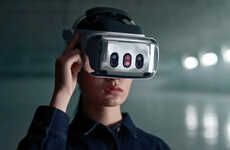



Virtual reality is adapted for pain relief and treatment in healthcare settings
Trend - The healthcare industry is now utilizing virtual reality (VR) environments and experiences to help patients manage or alleviate pain. This approach aims to distract users from their pain or discomfort, promote relaxation, and potentially reduce the need for traditional pain medications.
Insight - Consumers with chronic pain often seek products that can alleviate or divert their attention from their condition, especially if a cure is not available. Eliminating the need for in-person treatment, VR technology complements traditional pain management strategies by reducing the need for pharmacological solutions. Businesses catering to the demand for non-invasive, tech-based healthcare solutions can appeal to consumers looking for alternative ways to manage their health conditions.
Insight - Consumers with chronic pain often seek products that can alleviate or divert their attention from their condition, especially if a cure is not available. Eliminating the need for in-person treatment, VR technology complements traditional pain management strategies by reducing the need for pharmacological solutions. Businesses catering to the demand for non-invasive, tech-based healthcare solutions can appeal to consumers looking for alternative ways to manage their health conditions.
Workshop Question - How can virtual reality be used to elevate the capabilities and appeal of your product or service?
Trend Themes
1. Vr-based Pain Management - Harnessing virtual reality technology to deliver immersive therapeutic experiences offers new methods to manage and alleviate pain without reliance on traditional pharmacological treatments.
2. Bio-psycho-social Pain Relief - Integrating biofeedback with virtual reality redefines pain management by addressing not just the physical aspects but also the psychological and social factors contributing to chronic pain.
3. Procedural Choreography in Healthcare - Applying VR to transform and mitigate negative stimuli during medical procedures can significantly enhance patient comfort and procedural outcomes.
Industry Implications
1. Healthcare Technology - The collaboration of healthcare and technology sectors opens up vast opportunities for innovative solutions that integrate digital therapeutics with conventional medical practices.
2. Mental Health and Wellness - Technological advancements in VR provide a fresh perspective on addressing mental health challenges, thus expanding the toolkit for holistic health and wellness strategies.
3. Digital Therapeutics - Evolving digital platforms that offer personalized and interactive virtual care routines represent a major shift in the therapeutic landscape, emphasizing non-traditional treatment approaches.
4 Featured, 34 Examples:
28,623 Total Clicks
Date Range:
Dec 22 — Mar 24
Trending:
This Year and Warm
Consumer Insight Topics:





































